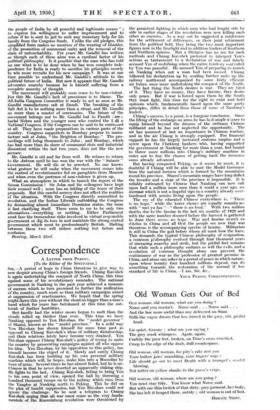Correspondence
A LETTER ER031 PEKING. [To the Editor of the SPECTA'POR,] SIR,—A period of hope in China threatens to give way to new despair among.China's foreign friends. Chiang Kai=slick is 'again undertaking the conquest of North China, this time against • some of his revolutionary comrades. The national government in Nanking in the past year achieved a measure of success which in turn promised to further the unification of the country, much more so than military campaigns aimed at suppression of reactionaries. We hoped that the spring might dawn this year without the cloud no bigger than a man's hand which for years has - betokened at this time the out- break of further hostilities.
But hardly had the winter snows begun to melt than the clouds rolled up thicker than ever.. This time we have Nanking opposed to Yen Hsi-shan, the "model governor" of Shansi, 'known as the "model province." In a mild way Yen Hsi-shan has shown himself for some time past as Opposed to Chiang Kai-shek's ideas of military dictatorship, and their relations lately have become very strained. Yen Hsi-shan opposes Chiang Kai-shek's policy of trying to unite the country by prosecuting campaigns against all who oppose his idea.- Yen Hsi-shan, by his opposition to this policy, has himself become the object of it Slowly and surely Chiang Kai-shek has been building up his own personal military machine which will; he hopes, make, him into a Mussolini by force of arms. Several times he has almost failed, but he is en- Chinese in that he never deserted an apparently sinking ship. He fights to the last. _Chiang Kai-shek, failing to bring Yen to -his own point of view, opened the ball by throwing. a hundred thousand troops on to the railway which rims from the Yangtse at Nanking north to Peking. This he did on the plea of bandit suppression, but Yen Hsi-Aan could not ignore the challenge. So he sent a telegram to Chiang Kai-shek urging that all war must cease as the very funda- mentals of the Kuomintang revolution were threatened by
the persistent fighting in which men who had fought side by side in earlier stages of the revolution were now killing each other as enemies. As a way out he suggested a conference for the settlement of differences, or their joint retirement from the political field, they being the two most important figures now in the limelight and in addition leaders of Southern and Northern opinion. But a Dictator has no use for such methods and Chiang Kai-shek preferred to interpret Yen's actions as tantamount to a declaration of war and falsely accused Yen of mobilising when the entire territory controlled by Yen was peaceful. He accused Yen of preparing to march on Nanking when not a man had been moved. Chiang followed his declaration up by sending further units up the railway northward accompanied by some fairly efficient air forces, once more undertaking the conquest of the North. The last thing the North desires is war. They are tired of it. They have no money, they have famine, they desire only peace. But if war is forced upon them by the South they must fight, this time for the right to exist and hold opinions which, fundamentally based upon the same party principles, differ in detail from those of some of Nanking's leaders.
Chiang's success, to a point, is a foregone conclusion. Since the lifting of the embargo on arms he has hr d ample e'iance to equip himself beyond the dreams of the ordinary Chinese militarist and he has not neglected the opportunity. The air has assumed at last an importance in Chinese warfare. and in the air Chiang is strongly equipped. For financial support he has the largely increased customs surplus and a screw upon the Chekiang bankers who, having supported the government at Nanking for more than a year, feel bound to throw more millions into Chiang's military machine in order not to lose the chance of getting back the immense sums already advanced. But having conquered Peking, as it seems he must, it is doubtful if Chiang will be able to oust the Model Governor from the natural fortress which is formed by the mountains round his province. Shansi's mountain ranges have long defied the invader and a siege of the province is impossible. It is reliably estimated by Chinese that Nanking can now call upon half a- million more men than it could a year ago, an increase which is not a hopeful sign in a country already over- burdened with armies living upon the people.
The cry of the educated Chinese everywhere is, There is no hope," while the lower classes are equally unanimm4 with " mei yu fan "—" there is no food." With two million deaths due to the famine in the last six months of 1929 and with the same number doomed before the harvest is gathered in June there seems no hope. War and famine m3rch en echelon in China and all that the people see now that war threatens is the accompanying spectre of famine. Militarism is still in China the god before whom all must bow the knee. This demands the typical Chinese philosophy of resignation, a common philosophy evolved through four thousand years of unceasing anarchy and strife, but the pitiful fact remains that while such a philosophy endures so will the evils, and a revolution of common thought alone can prevent the continuance of war as the profession Of greatest promise in China, and alone can usher in a period of peace in which nature, upon Whose bounty four hundred millions depend, can do something towards the restoration of the normal if low standard of life in China.—I am, Sir, &c.,
YOUR PEKING CORRESPONDENT.










































 Previous page
Previous page